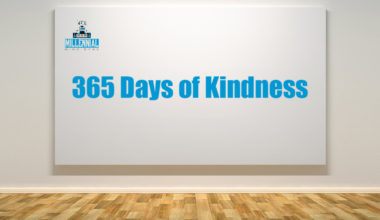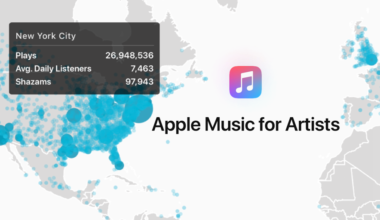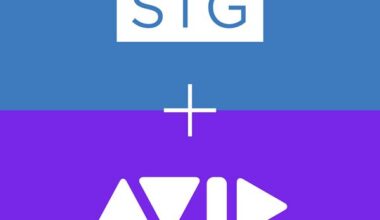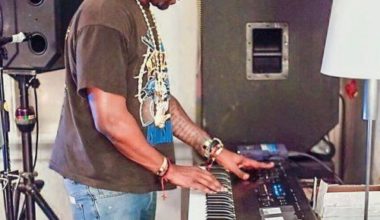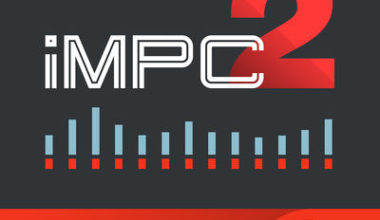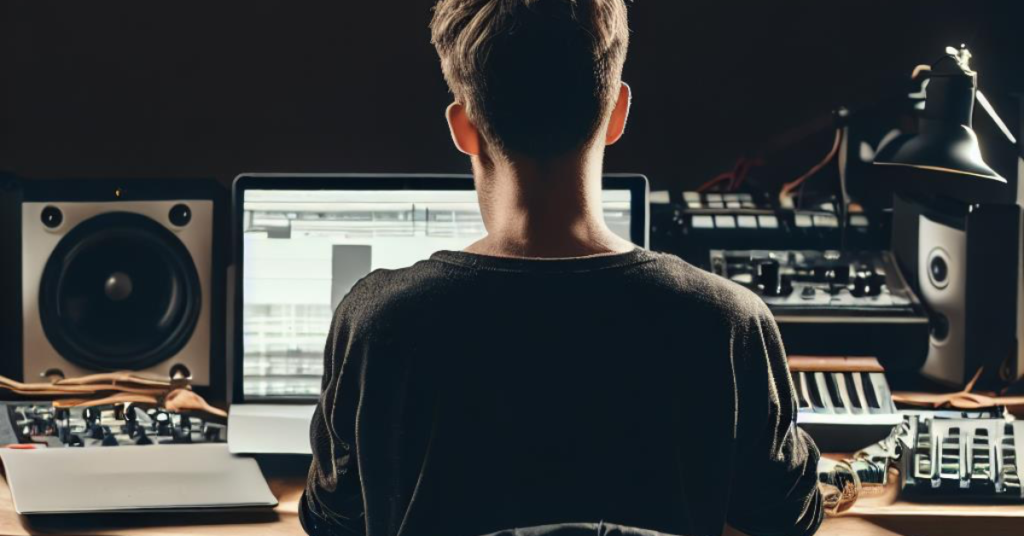
Diving into the sonic realms, aspiring music makers are akin to architects of sound. With every beat, note, and harmony, they craft intricate layers that meld together into a symphony of emotion and energy bringing the urge to learn how to become a music producer.
Mixing melodies, fine-tuning pitches, and sculpting the aural landscape, music production is an intricate art that marries creativity with technical prowess.
It’s a boundless playground where the left-brained analytical genius shakes hands with the right-brained artistic virtuoso.
If you’re looking to embark on a career that doesn’t chain you to a monotonous desk job, but rather lets your creativity flow like a river, unfettered and full of life, this comprehensive guide on how to become a music producer is tailored for you.
Whether you envision yourself at the helm of a chart-topping album, or being the invisible maestro behind evocative scores in cinema, the journey begins with a single step.
From honing your craft to understanding the tools of the trade, from building a network that supports your dreams to making your indelible mark in the music industry, we’ve got you covered.
Let us unravel the tapestry of sounds and take you on a journey through the making of a music producer.
Discover Your Sound and Genre
To set your foundation strong, identify the type of music that resonates with you.
As a fledgling music producer, your affinity with a particular genre will shape your creative expression.
It’s akin to finding your voice in a sea of sounds.
Delving into a genre you’re passionate about is the essence of how to become a music producer.
Whether your heart lies with the soulful melodies of R&B, the electrifying beats of EDM, the raw energy of rock, or the poetic flow of hip-hop, it’s imperative to explore and understand the intricacies of the genre that speaks to you.
Listening to a plethora of tracks, understanding the elements that make them unique, and even trying to recreate or remix some of them can be incredibly enlightening.
This stage is not just about preference; it’s about connection.
Connect with the sound that makes your soul sing. Immerse yourself in the culture and community that surrounds your chosen genre. Engage with artists, listen to their journeys, and even collaborate to gain insights and grow as a music producer.
Remember, your chosen genre is going to be the canvas for your art; make sure it’s one you’ll never tire of painting on.
Education and Training
While raw talent is a great starting point, education in music production helps hone and refine your skills.
It’s like sharpening your tools before embarking on a masterful creation.
Consider enrolling in specialized music production courses. Traditional brick-and-mortar institutions offer degrees and certificates in music production, audio engineering, and related fields.
But don’t underestimate the power of online learning! My book has taught thousands how to place their music in television and film projects.
The digital world is teeming with online tutorials, courses, and workshops. Platforms like Coursera, Masterclass, and Skillshare offer a plethora of courses tailored for aspiring music producers.
Beyond structured courses, stay vigilant and curious. The music industry is a vibrant, ever-evolving creature. Technologies and techniques that are in vogue today might be passé tomorrow.
Subscribing to industry magazines, joining forums, and following influential music producers on social media are excellent ways to stay abreast of the trends.
Get your hands on the latest software and gear. Understand the capabilities of various Digital Audio Workstations (DAWs) like Ableton Live, FL Studio, or Logic Pro.
Experiment with different plugins and synthesizers. Attend workshops, webinars, and industry events.
Networking during these events can also pave the way for future collaborations and opportunities.
Your education as a music producer is an ongoing journey. Stay hungry for knowledge, and never stop refining your craft. This continual growth is pivotal in understanding how to become a music producer who stands out in the crowd.
Get The Tools
Just as a carpenter needs a toolbox, a music producer needs gear.
Think of these tools as your sonic arsenal, and arm yourself wisely.
First and foremost, you’ll need a powerful computer. Whether you prefer a Mac or a PC, ensure it has enough processing power and memory to handle the demands of music production. Your computer is your command center, so invest wisely.
Next up is choosing a versatile Digital Audio Workstation (DAW). This is where the magic happens! A DAW is essentially the software you’ll use to record, edit, mix, and produce music. Popular options include Ableton Live, FL Studio, Logic Pro, and Pro Tools. Each DAW has its unique flair, so explore a few to discover which one resonates with your workflow and creativity.
Top-notch studio monitors are a must. These aren’t your everyday speakers; studio monitors are designed for audio production, providing a clear and accurate representation of your sound. This is crucial for mixing and mastering.
Don’t skimp on reliable headphones either. A pair of high-quality studio headphones will give you a different perspective on your mixes. They’re also essential for those late-night sessions when you don’t want to disturb the neighbors.
Consider getting a MIDI keyboard. While optional, a MIDI keyboard can be an incredibly versatile tool in your production arsenal. It doesn’t just play notes – it can trigger samples, control your DAW, and more. It’s particularly useful if you have a background in playing the piano or if you’re looking to create melodies and chord progressions more naturally.
Microphones, audio interfaces, and a host of plugins are also worth considering as you dive deeper into production.
Last but not least, familiarize yourself with these tools. They will be your paintbrushes on the canvas of sound, and knowing them inside out will be integral to your ability to paint masterpieces.
As you grow and evolve as a producer, your toolkit will likely expand. But getting started with these basics is an essential step in how to become a music producer. Remember, it’s not just the tools, but the artist wielding them that creates magic.
Practice and Experiment
In the world of music production, practice is the crucible where skills are forged and refined.
As an aspiring music producer, it’s vital to understand that learning never stops. Engage in continuous experimentation with different sounds, styles, and techniques. This phase is not just about honing your technical skills, but also about innovation, trial and error, and expanding your creative horizons.
Start by dedicating time every day to practice. Even if it’s just an hour a day, the consistency is key. Work on small projects, create beats, or simply play around with different sounds in your DAW.
Don’t be afraid to make mistakes. Often, some of the most groundbreaking sounds come from unexpected places. So let your creativity run wild and see where it takes you.
Collaborate with other musicians or producers. Working with others can not only be incredibly inspiring but can also expose you to different approaches and techniques that you might not have discovered on your own.
Challenge yourself by trying to recreate your favorite tracks. This can be an amazing learning experience, as it forces you to really listen and analyze what’s happening in the mix.
Keep an ear out for new music and genres. Being open to different styles can significantly expand your creative palette. Sometimes a fusion of unexpected genres can lead to something truly unique.
Collect feedback on your work. Whether it’s from friends, family, or fellow producers, constructive feedback is invaluable. It will help you identify areas that need improvement and can sometimes provide new ideas that you hadn’t considered.
Lastly, remember to keep an open mind and never get too comfortable. The moment you think you know it all is the moment you stop growing. The landscape of music is ever-evolving, and as a producer, your adaptability and willingness to experiment are your greatest assets.
By committing to continuous practice and fearless experimentation, you’ll be laying the groundwork for not just becoming a music producer, but a pioneering force in the sonic realms.
Build A Portfolio
Consider your portfolio as the gateway to your world of music, an audible testament to your creativity and technical skills.
It should showcase not only your best works but also the range and diversity of your skills. A versatile portfolio opens doors in the music industry and leaves a lasting impression on potential collaborators or employers.
Start by picking your strongest pieces. These are the tracks that best represent your style and the quality of your work. However, don’t just include similar sounding tracks.
Embrace diversity in your portfolio. If you have experimented with different genres, include samples from each. This demonstrates your versatility and adaptability, qualities that are highly sought after in the music industry.
Don’t forget to include any collaborations you have been a part of. This shows that you can work well with others, an essential trait for a music producer.
Ensure that your portfolio is easily accessible. In this digital age, having an online presence is critical. Create a simple website or use platforms like SoundCloud or Bandcamp to showcase your work.
Keep your portfolio organized. Categorize your tracks by genre or mood, and ensure that the interface is easy to navigate. First impressions matter, and an organized portfolio speaks volumes about your professionalism.
Additionally, provide context for each piece – a short description detailing what inspired the track or what you aimed to achieve can add depth to your work.
Update your portfolio regularly. As you grow and evolve as a producer, your portfolio should reflect that. Regularly adding new content also keeps your audience engaged.
Don’t be shy about promoting your portfolio. Share it on social media, and actively reach out to artists, producers, or companies you want to work with.
Remember, your portfolio is more than just a collection of your tracks; it’s an expression of who you are as a music producer. It should evolve with you and continuously be refined.
Invest time and effort in creating a stellar portfolio, for it is through this sonic showcase that the world will get to hear your unique voice.
Network and Collaborate
Connections can make or break your career. In the world of music production, who you know is often as important as what you know.
Build relationships with fellow artists, musicians, and producers. Engaging with like-minded individuals not only helps in the sharing of knowledge and techniques but also in gaining diverse perspectives that can enhance your creativity.
Collaboration is both a gateway to learning and a pathway for gaining exposure in the industry. By teaming up with others, you can expand your skillset and tap into different audiences. It’s a symbiotic relationship where both parties benefit from each other’s strengths.
Attend industry events, seminars, and workshops. These are excellent avenues to meet people who share your passion. Engage in conversations and be genuinely interested in what others are doing. A simple chat can sometimes lead to exciting opportunities.
Harness the power of social media. Follow and interact with established producers, artists, and record labels. Engage in online communities and forums where discussions about music production take place.
Remember to offer value in your interactions. Instead of just asking for favors, think about how you can help others. Whether it’s giving feedback, sharing a contact, or assisting in a project, small gestures can go a long way in building strong relationships.
When you do collaborate, communicate openly. Be clear about your vision, but also be receptive to ideas. A successful collaboration is one where all parties feel that they have contributed to the final product.
Keep in touch with the people you meet. Networking is not a one-off activity. It’s about building and maintaining relationships over time. Reach out to people occasionally, even if it’s just to say hello or share something interesting.
Finally, be professional and respectful in all your interactions. The music industry is smaller than you might think, and word travels fast. Building a reputation as someone who is easy to work with and reliable can be a significant asset in your journey on how to become a music producer.
In summary, networking and collaborating is an art in itself. Approach it with an open mind, a willingness to learn, and a genuine interest in others, and it can open doors you never thought possible.
Market Yourself
In the age of the internet, your online presence is pivotal. The digital world is a vast ocean full of opportunities, and knowing how to navigate it can set the sails for your music production career.
Leverage social media platforms to share your work, engage with your audience, and build a following. Creating an engaging presence on platforms like Instagram, Twitter, Facebook, and YouTube is an essential component of your journey in learning how to become a music producer. Regularly post content that reflects your brand as a producer, and offer value to your audience through sharing insights, behind-the-scenes content, and engaging music.
Understanding and utilizing digital marketing is indispensable. Familiarize yourself with the tools and strategies of digital marketing. Learn about search engine optimization, email marketing, and paid advertisements. Use these tools to promote your work, target your desired audience, and build a fan base.
Create a professional website. A sleek, well-designed website acts as a digital business card and portfolio. It should reflect your brand, showcase your best work, and provide a way for potential collaborators or clients to contact you. Make sure it is updated regularly and includes links to your social media profiles.
Take advantage of music platforms such as SoundCloud, Bandcamp, and Spotify to share your music. These platforms are often scoured by both fans and industry professionals looking for new talents. Be sure to optimize your profiles on these platforms to make them appealing and informative.
Participate in online communities and forums. Engage in discussions about music production, share your insights, and provide feedback to others. This not only helps in establishing your presence but also in learning from others.
Collaborate with influencers and other artists on social media. This can help in expanding your reach and tapping into new audiences. However, ensure that these collaborations align with your brand and artistic values.
Track your analytics. Use data from your social media profiles and website to analyze your audience, see what content they engage with the most, and adjust your strategies accordingly. This information is invaluable for making informed decisions about your marketing efforts.
Be consistent and patient. Building an online presence and marketing yourself effectively is a marathon, not a sprint. It takes time, effort, and dedication.
In summary, marketing yourself as a music producer in the digital age requires a combination of creativity, knowledge of digital marketing tools, and engagement with your audience. It’s an integral part of how to become a music producer, and doing it effectively can make a world of difference in your career.
Seek Professional Opportunities
Be on the lookout for opportunities, even if they whisper. The path to becoming a successful music producer is often paved with a mix of small steps and giant leaps. You never know when or where your big break might come, so it’s essential to keep your ears to the ground and remain open to a plethora of avenues.
Keep an eye out for openings at recording studios, entertainment companies, or any place that aligns with your career goals. These establishments are often looking for fresh talents who can bring a new perspective. Being in a professional environment will also offer you a wealth of experience and expose you to the industry’s inner workings.
Freelance projects are another avenue that can prove to be golden tickets to your big break. Platforms like Upwork, Fiverr, and SoundBetter allow you to offer your services as a music producer. Through freelancing, not only do you earn, but you also build a network, garner real-world experience, and add to your portfolio.
Internships can be invaluable. If you’re just starting, an internship at a recording studio or music company can give you insights that are impossible to gain elsewhere. It offers hands-on experience, networking opportunities, and might even lead to a permanent position.
Engage in local music scenes. Attend gigs, events, and music festivals. Engaging in your local music community is not just about finding opportunities but also about understanding the audience, the trends, and establishing yourself as a known face in the music circles.
Be proactive in reaching out. Don’t hesitate to send emails or make calls. If there’s a studio or producer you admire, let them know. Share your portfolio and express your interest in collaboration or learning. Even if it doesn’t immediately lead to an opportunity, it establishes a connection that could bear fruit in the future.
Participate in contests and competitions. There are numerous music production competitions that you can enter. Winning or simply participating in these contests can put you on the radar of industry professionals.
Remember that in the world of music production, your next opportunity might not always come wrapped in a ribbon. It might be an unexpected phone call, a chance meeting, or a freelance project that suddenly gains traction. Stay alert, be adaptable, and make the most of every opportunity on your journey in learning how to become a music producer.
Conclusion
Embarking on the path to becoming a music producer is akin to setting sail on a vast ocean of soundscapes, where creativity and technical acumen guide you through uncharted waters. The journey is filled with exciting opportunities, challenges, and continuous learning. Throughout this article, we have explored the multifaceted layers that form the foundation of how to become a music producer.
Beginning with discovering your sound and genre, it’s imperative to have a clear vision and passion for the kind of music that resonates with you. This is the guiding star that will shape your artistic expression.
Education and training equip you with the knowledge and skills required to navigate the technical aspects of music production. By staying updated with evolving technologies and honing your craft through courses and tutorials, you build a strong backbone for your career.
Acquiring the right tools is essential in creating the sonic landscapes you envision. A powerful computer, a versatile DAW, studio monitors, headphones, and a MIDI keyboard are some of the fundamental tools that become an extension of your creativity.
Engaging in relentless practice and experimentation, you not only refine your skills but also invent and discover new sounds, techniques, and styles. It’s through practice that you challenge your boundaries and expand your horizons.
Building a diverse and captivating portfolio showcases your best works and acts as a testament to your skills and versatility. It becomes your calling card in the industry.
Networking and collaboration with other artists, musicians, and producers serve as conduits for learning, exposure, and mutual growth. These connections can play a significant role in your career trajectory.
In the digital age, marketing yourself effectively through online platforms is indispensable. Utilizing social media and digital marketing strategies is essential in establishing your brand, engaging with your audience, and building a following.
Actively seeking professional opportunities, whether it’s in recording studios, through freelance projects, internships, or participating in competitions, helps in gaining practical experience and opens doors to possibilities that could define your career.
As you chart your course in this captivating realm, remember that becoming a music producer is not a destination but an ongoing journey. It is a vocation that requires dedication, perseverance, adaptability, and a deep love for music. May your passion be the wind in your sails as you navigate the enthralling world of music production.
